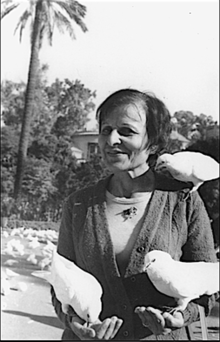Rose Ghorayeb
Rose Ghorayeb | |
|---|---|
 Rose Ghorayeb | |
| Born | 1909 |
| Died | 2006 (97 years old) |
| Nationality | Lebanese |
| Occupation(s) | Writer, Author, Professor |
| Years active | 70 |
Rose Ghorayeb (Arabic: روز غريّب, born 1909 – died 2006) was a Lebanese writer, author, literary critic, and feminist. She was a professor of Arabic literature at the Lebanese American University and was frequently referred to as the "first female critic in Arabic literature".[1] Regarded as a pioneer in aesthetic criticism, her literary career spanned more than 70 years and included many children stories, articles, biographies and plays.[2][3]
Biography
[edit]Ghorayeb was born in Damour, Lebanon in 1909.[4] In 1932, she graduated from the American Junior College for Women in Beirut, a predecessor to the Lebanese American University. In 1948, the college renamed itself the Beirut College for Women.[5] She later became the head of the college's Arabic department.
She published extensively in many regional Arabic magazines and journals from 1943 to 1980.[6] As a women's rights activist, she regularly wrote for the Lebanese monthly magazine The Woman's Voice.[1] She also frequently published articles in the Voice of Bahrain, Bahrain's first magazine, and this was believed to have played a role in the introduction of new social ideas in the country.[7] Amongst her most notable works was a biography on the Lebanese-Palestinian poet May Ziadeh, who was regarded as a pioneer in Middle Eastern feminism in the early 20th century.[8][9] From 1983 to 1993, she served as the editor of Al-Raida, the journal of the Lebanese American University's Institute for Women's Studies in the Arab World.[1]
Works
[edit]- Ghorayeb, Rose (December 1979). "May Ziadeh (1886–1941)". Signs: Journal of Women in Culture and Society. 5 (2): 375–382. doi:10.1086/493725.
References
[edit]- ^ a b c "LAU Magazine & Alumni Bulletin (Winter 2011, Vol. 13, Issue no.4)". Issuu. 13 (4). 27 November 2011. Retrieved 21 August 2019.
- ^ الأسعد, محمد (25 September 2016). "روز غريّب.. مشروع القارئة الجمالي (Arabic)". arabi. Retrieved 22 August 2019.
- ^ "رحيل أديبة الأطفال اللبنانية روز غريب – ديوان العرب". diwanalarab.com. 13 January 2006. Retrieved 22 August 2019.
- ^ "Welcome to Damour city". www.damourcity.com. Retrieved 21 August 2019.
- ^ Malaeb, Abdullah; El-Shaikh, Rawan (28 January 2019). "LAU's history of women empowerment". An-Nahar. Retrieved 22 August 2019.
- ^ "أرشيف المجلات الأدبية والثقافية العربية (Arabic)". archive.alsharekh.org. Retrieved 22 August 2019.
- ^ al-Najjar, Sabika (2003). "The Feminist Movement in the Gulf" (PDF). Al-Raida. 20 (100): 30. Retrieved 21 August 2019.
- ^ Mezher, Hala; Ajjan, Maysaa (12 March 2019). "The women who shaped Lebanon". An-Nahar. Retrieved 22 August 2019.
- ^ *Ghorayeb, Rose (December 1979). "May Ziadeh (1886–1941)". Signs: Journal of Women in Culture and Society. 5 (2): 375–382. doi:10.1086/493725.
